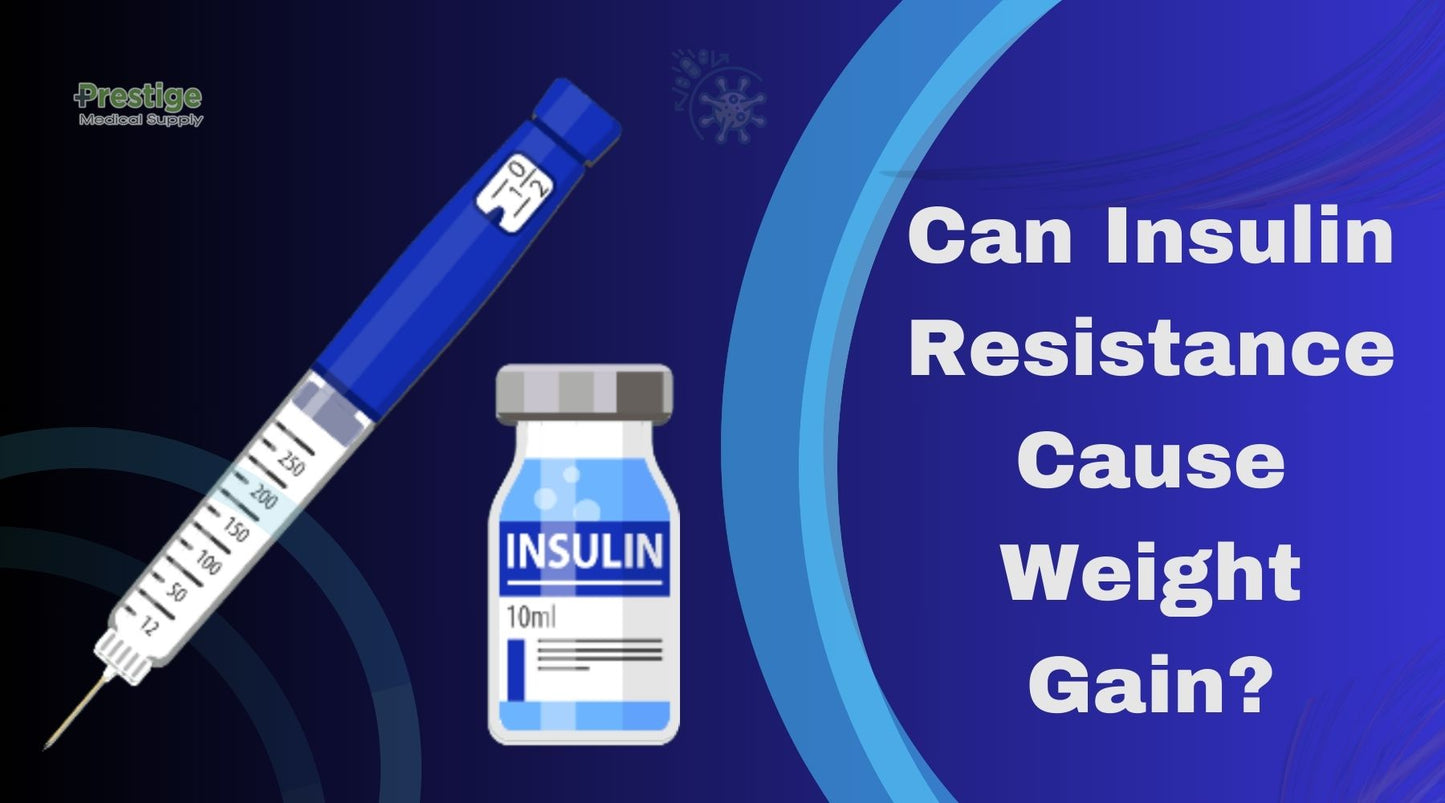
Can Insulin Resistance Cause Weight Gain?
Have you ever wondered if insulin resistance could be the hidden culprit behind your struggles with weight gain?
It's a question worth exploring, especially if you're at risk for type 2 diabetes.
"If you suspect insulin resistance or are at risk, don't hesitate to consult your physician for guidance on managing this condition, which extends far beyond mere willpower," urges Dr. Michael W. Lee, an esteemed endocrinologist and weight management specialist at the prestigious Scripps Clinic Center for Weight Management.
"Weight loss challenges might stem from how your body responds, or rather, doesn't respond, to insulin."
The good news is that you can take control of your health journey.
Your doctor may recommend a multifaceted approach, involving a low-carb diet, regular exercise, and, when necessary, medications to combat insulin resistance. But the first step is recognizing if you have this condition.
"Your physician can diagnose and offer strategies to reverse insulin resistance and potentially prevent or delay the onset of type 2 diabetes," emphasizes Dr. Lee.
What Is The Role of Insulin In The Body?
Insulin is a hormone produced by the pancreas that plays a crucial role in regulating blood sugar levels and facilitating glucose uptake into the cells.
When we eat carbohydrates, they are broken down into glucose, which enters the bloodstream. In response, the pancreas releases insulin to help transport glucose from the bloodstream into the cells, where it can be used for energy production.
In addition to its role in glucose metabolism, insulin also influences the storage and breakdown of fat in the body. When insulin levels are elevated, fat storage is promoted, while fat breakdown is inhibited.
This is why individuals with insulin resistance often struggle to lose weight, as their bodies are predisposed to storing fat rather than burning it for energy.
Defining Insulin Resistance: A Closer Look
Insulin resistance is a condition in which the body's cells become less responsive to the hormone insulin.
Insulin plays a pivotal role as a metabolic hormone produced by the pancreas when you consume food. It signals to your body's cells that a readily available source of fuel, in the form of blood sugar or glucose, is on hand.
However, in certain circumstances, for various reasons, the body's cells fail to respond to insulin as they should. This resistance to insulin prevents them from efficiently extracting sugar from the bloodstream.
The pancreas reacts by increasing insulin production in an effort to cope with the rising blood sugar levels. This condition is known as hyperinsulinemia.
When your cells become highly resistant to insulin, it can lead to elevated blood sugar levels, which, in turn, contribute to weight gain, prediabetes, and eventually, type 2 diabetes.
When dealing with insulin resistance, shedding excess weight can be more challenging because the body tends to store surplus blood sugar as fat.
Causes and Risk Factors of Insulin Resistance
Here are certain factors that have been linked with this condition. These include:
-
Obesity (defined as having a certain body mass index, or BMI)
-
Eating a high-calorie, high-sugar diet
-
Lack of physical activity
-
Taking high doses of a steroid
-
Chronic stress
-
Having polycystic ovary syndrome (PCOS) or Cushing’s disease
Some people are also at a higher risk for developing insulin resistance. These include people:
-
With a family history of type 2 diabetes
-
With a personal history of gestational diabetes
-
Over the age of 45
-
Who are Hispanic, African American, Native American, or Asian American
-
With a waist circumference larger than 40 inches (men) or larger than 35 inches (women)
-
With a history of high blood pressure (hypertension) or high triglycerides
The risk factors for insulin resistance are similar to the risk factors for prediabetes and type 2 diabetes. But lifestyle changes can help your body use insulin properly, which can reduce your risk of diabetes.
Signs of insulin resistance:
-
Elevated blood sugar levels
-
High blood pressure
-
Elevated triglyceride levels (a type of blood fat)
-
Elevated LDL (bad cholesterol)
-
Low HDL (good cholesterol)
Symptoms of insulin resistance
Insulin resistance often develops gradually and may not present with obvious symptoms in the early stages. However, as the condition progresses, individuals may experience symptoms such as
-
Increased thirst
-
Frequent urination
-
Difficulty losing weight
-
Fatigue
-
Heightened hunger
-
Blurred vision
-
Headaches
-
Vaginal and skin infections
-
Slow-healing cuts and sores
These symptoms are often indicative of high blood sugar levels and insulin dysregulation.
It is important to note that insulin resistance can increase the risk of developing other health conditions, such as type 2 diabetes, metabolic syndrome, and cardiovascular disease. Therefore, it is crucial to identify and address insulin resistance early on to prevent further complications.
Strategies for Managing Insulin Resistance and Weight Gain
Managing insulin resistance and weight gain requires a multifaceted approach that encompasses dietary and lifestyle changes. Here are some strategies that can help improve insulin sensitivity and promote weight loss:
Diet and lifestyle changes to improve insulin sensitivity
-
Focus on a balanced diet that includes whole, unprocessed foods, lean proteins, healthy fats, and high-fiber carbohydrates. Avoid or limit foods high in refined carbohydrates, sugars, and trans fats.
-
Incorporate regular meals and snacks throughout the day to maintain stable blood sugar levels. Avoid skipping meals or prolonged periods of fasting, as this can lead to blood sugar fluctuations.
-
Include physical activity as part of your daily routine. Regular exercise can improve insulin sensitivity and help with weight management. Aim for a combination of cardiovascular exercises and strength training.
-
Get enough quality sleep. Lack of sleep can disrupt hormonal balance and increase the risk of insulin resistance. Aim for 7-9 hours of uninterrupted sleep per night.
Exercise and Physical Activity Recommendations for Insulin Resistance
-
Engage in aerobic exercises, such as walking, jogging, cycling, or swimming, for at least 150 minutes per week. This can help improve insulin sensitivity and promote weight loss.
-
Incorporate resistance training exercises, such as weightlifting or bodyweight exercises, at least twice a week. This can help build lean muscle mass, which can improve insulin sensitivity and boost metabolism.
-
Consider incorporating high-intensity interval training (HIIT) into your exercise routine. HIIT workouts involve short bursts of intense activity followed by periods of rest and can be an effective way to improve insulin sensitivity and burn calories.
It is important to remember that managing insulin resistance and weight gain is a long-term commitment that requires patience and consistency. By making informed choices about your diet and lifestyle, you can empower yourself to take control of your health and achieve optimal well-being
Conclusion
The Key to Success: Healthy Weight Management
Even if you aren't insulin-resistant, Dr. Lee emphasizes the benefits of reducing your intake of simple carbohydrates as a healthy dietary choice. The ultimate key to successful weight loss lies in consistency and sustainability.
"It is possible to lose weight and maintain that loss on any kind of reduced-calorie diet, especially if it allows foods you enjoy, making it easier to stick to," Dr. Lee affirms.
Now, take control of your health and explore the possibilities of overcoming insulin resistance. And remember, you can find insulin pump and insulin pump supplies at Prestige Medical Supply, with an exclusive 15% discount using the code: PrestigeSave15. Act now for a healthier tomorrow!
______________
**EXTRAS**
When it comes to tackling insulin resistance with advanced tools, there's a game-changing ally you should know about: the insulin pump. This innovative device, coupled with essential pump supplies, can also be a game-changer in your journey to better health.
The insulin pump is a powerful tool that offers precise control over insulin delivery, enhancing your ability to manage insulin resistance effectively.
Benefits of Insulin Pump Includes:
-
Precision Dosage: Insulin pumps provide precise insulin delivery, essential for managing resistance effectively.
-
Continuous Monitoring: Many pumps include continuous glucose monitoring (CGM), offering real-time blood sugar insights, one of which would be the Medtronic Minimed 770G Insulin Pump.
-
Convenience: Say goodbye to multiple daily injections with insulin pumps, simplifying your routine.
-
Improved A1C: Studies show that insulin pump therapy can lead to better A1C levels, reducing resistance-related risks.



